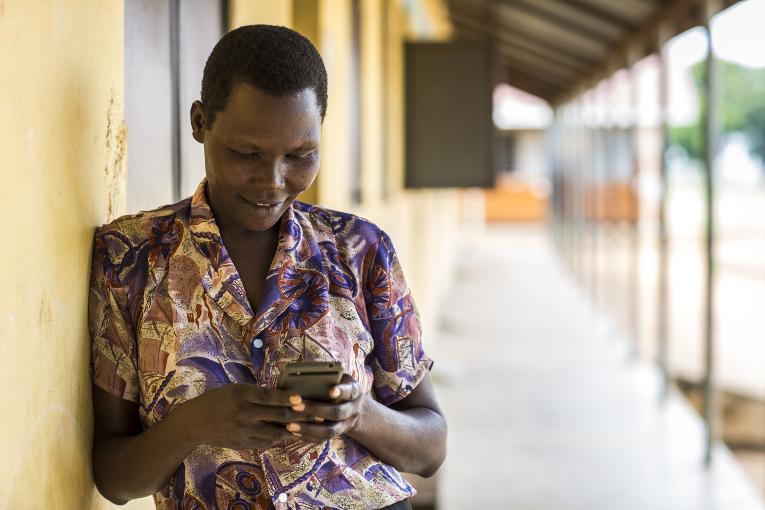Mobile mentoring increases Ugandan teachers’ pride in their profession
A smartphone and a connection to Finland revolutionised teaching at Pagirinya comprehensive school in Uganda. Teachers receive advice via the Whatsapp application, even in the middle of a work day.
How can one teacher manage a class with 130 pupils?
Maurine Anguezaru was faced with this problem about two years ago as she started as a teacher at Pagirinya comprehensive school. Thousands of refugees per day were coming to Northern Uganda from South Sudan.
”Upon arrival, the refugees were silent and shy, and some arrived without their parents,” she shares.
Advice came from her new smartphone, providing her with support in teaching-related challenges from a Finnish teacher. Mobile mentoring is a part of FCA’s teacher training.
Anguezaru says she has learned a lot from the advice and links shared by her mentor. The smartphone is her first, and thanks to her mentor, she has many new sources of information.
”Mentoring has made me more confident and better at spotting symptoms of trauma. I’m learning new ways to react to constant tardiness, rowdy behaviour or withdrawing,” Anguezaru praises the programme.

For teacher Sarah Atimaku, the biggest challenge at Pagirinya has been the language barrier between Ugandans and the South Sudanese. She herself speaks the language spoken by the South Sudanese, Arabic, and mobile mentoring has given her advice on how to help them follow the teaching in English.
Dialogue brings teachers together
In two years, FCA has offered mobile mentoring to a total of 120 teachers in Adjumani and Moyo. The teachers work in schools with both Ugandan and South Sudanese pupils.
The teachers go through teacher training provided by FCA in Uganda. They learn things such as pedagogy, acknowledging pupils’ special needs, and developing a curriculum. The learning is supported by Whatsapp groups, with a Finnish mentor giving advice to a set number of Ugandan teachers.
The Finnish teachers have also turned out to be active and committed to dialogue, says Roosa Laine, volunteer with the FCA-coordinated Teachers Without Borders network in Adjumani.
”They have also encouraged the teachers to ask questions. In addition, the dialogue has inspired the Ugandan teachers to collaborate more actively at school while planning their teaching,” says Laine.
”The programme has clearly increased these teachers’ pride in their profession.”
Mobile phones off during classes
The Whatsapp groups are not used for messaging while teaching a class, but during breaks between classes, urgent support is also available, depending on the mentor. Anguezaru’s group exchanges messages on a daily basis.
According to her, teachers may even record their classes to be assessed by others. For example, she has exchanged messages with Auli from Finland about the challenges she faced during geometry classes.
”I can say ‘hey, I’m having trouble with how to teach this topic.’ At the end of the school day, I can tell Auli how her advice worked,” says Anguezaru.
According to Anguezaru, the mentoring has clearly improved pupils’ performance at Pagirinya. She feels especially motivated by the change in the school’s atmosphere.
”The pupils have become very friendly, and I treat them like my friends. No one is left on their own.”
Text: Erik Nyström, Photos: Patrick Meinhardt